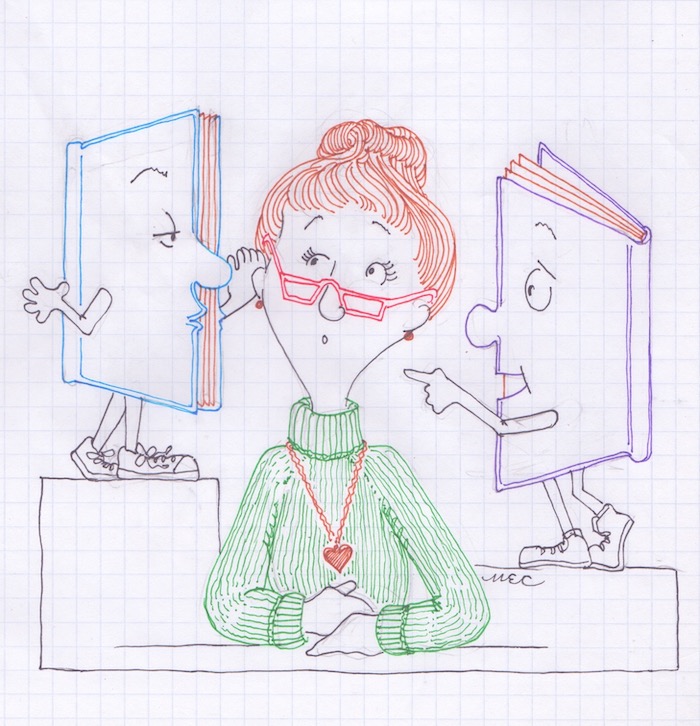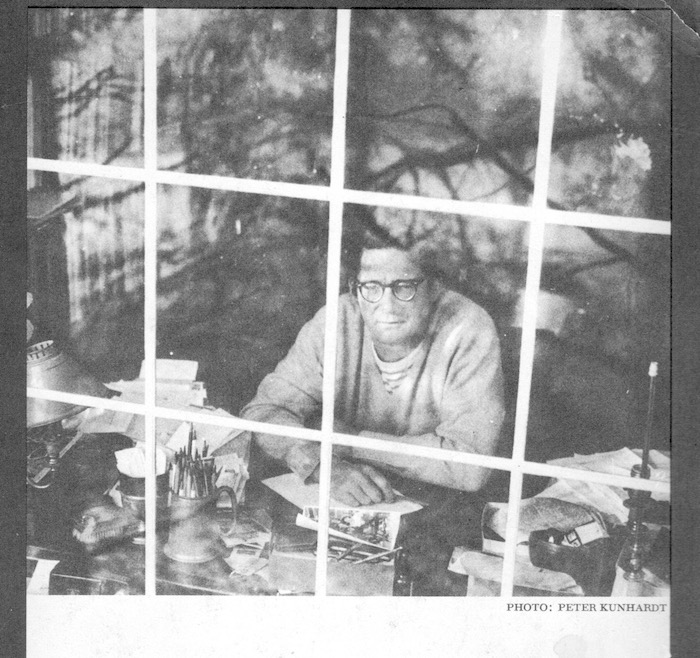How Books Talk to Each Other

Johannes Gutenberg
changed the world by putting more words in the hands of more
people. But a thousand pages in the hand do not have the worth
of one in the reader’s mind. The magic happens between the
page and the brain.
_____________________________
In 2018,
scientists discovered the interstitium - the largest
organ in the human body. It’s a fluid highway that wraps and
connects all the other organs, performing feats of service in
the space between. Turns out a lot of work happens between the
organs we’ve always known about, done by a near-invisible
organ that went undetected for centuries.
So many things
happen in what looks like blank space between tangible things.
If you plunk out the notes of “Amazing Grace” on a piano
without the proper spaces, the song is unrecognizable. The
empty space is essential.
We’re told to
“read between the lines” when we need to grasp that more is
going on than meets the eye. In the Book of Proverbs, there’s
a lot of room for pondering in the blank space between the
halves of a verse. Take Solomon’s first attributed proverb,
Proverbs 10:1: “A wise son makes a glad father; but a
foolish son is the heaviness of his mother.” Two fairly
obvious points, but wait! The space between the two statements
gives you enough to ponder for days – in that space lies the
difference between fathers and mothers, wisdom and
foolishness, gladness and heaviness. The simple verse isn’t
simple at all when the reader stops in the space between the
two thoughts, looks ahead and behind, and ponders. Multiple
lessons lie between the lines, waiting to ambush a thoughtful
observer.
Of course this
applies to reading in general.
Maybe you’re like
me: you have one book in the upstairs bathroom, one in the
downstairs, two or three bedside. You probably have some way
of choosing reading material: my husband acts vigorously on
recommendations; my parents belonged to one of those
book-a-month clubs. I have a friend who finds an author he
likes and systematically reads their every book. Some rely on
best-seller lists. My books come to me washed up on the shores
of used book shops and thrift stores. I’ve always trusted that
it’s God arranging my curriculum. Time and time again, exactly
what I needed to read showed up exactly when I needed to read
it.
Here’s how this
worked in the summer of 2001, when my older son was about to
leave for college, and I was aching at the impending end of
the family unit. Upstairs, I was reading John Eldredge’s The
Journey of Desire (if you don’t love John Eldredge, you
and I will have to talk), while downstairs sat Philip
Kunhardt, Jr.’s 1970 reminiscence, My Father’s House,
like a ticking bomb.
The two books talked to each other
all summer, using the space between my ears as their
parlor. My
Father’s House held surprises. Author Kunhardt, a fellow
New Jersey-ite, was a managing editor of Life magazine
– a publication delivered weekly to my childhood home and
which I, starved for new reading material, devoured hungrily
upon arrival. He grew up in the woods in Morris County – me,
too! He wrote this book after surviving the kind of heart
attack that killed his father in 1963. It is a very personal
book.
It became that to
me, too. Kunhardt’s aim is to describe the upbringing his
father bestowed on him. Gruff-but-caring, adventurous,
instructive, free-wheeling but hands-on. A marvelous
upbringing, a storybook upbringing. The kind of upbringing my
own father would have had, (because he grew up in the same
place, at the same time), had he only had a decent
relationship with my grandfather. Today I searched out my copy
of My Father’s House to ascertain particulars of
publication, and found myself in tears, just as in 2001.
But those tears
were a function of the Eldredge book, a book that encourages
good people trapped in shoulds and oughts to
consider their hearts, to examine them for what they love, and
to embrace that love as God’s gift. The Journey of Desire
(retitled Desire in recent editions) handed me
permission to love Haydn symphonies and old British murder
mysteries and the complex designs of good silk scarves. And,
to embrace the goodness in the Kunhardt book, which I would
not have done without it.
The Journey of
Desire opened up my thinking like the key on a sardine
tin. Before reading it, I had thought depriving myself was a
necessary reflexive exercise, to be done any time I liked
/wanted /enjoyed something. As a result, I squelched things
God put in my heart. These two books worked like two friends
come in to do an intervention, chipping away at assumptions
I’d held and lies I’d believed. I wept all summer, reading the
two books and contemplating their admixture of kindness,
mercy, parental love, and beauty. They stitched up a corner of
my soul I didn’t know was ripped. By the time Jimmy left for
college, I felt prepared for the change, prepared to carry on,
peaceful.
Neither book would
have had its effect without the other, yet neither one said,
outright, what I derived from it. The magic happened in the
space between the books.
Words on a page
set up a spate of synapse-jumps in the brain. Reading more
than one book multiplies the effect of the jumps, because the
world of more than one writer’s brain gets added to the world
of the reader’s. Stereos is a Greek word, sometimes
translated “established,” denoting something confirmed from
more than one source. We get “stereo” from it. This tag-team
reading has a stereos effect – two different streams
of thought converge and contribute to each other, the effect
multiplied not arithmetically, but exponentially, as I ponder
what they say. Pondering the written word acts like the
interstitium. It provides the space for the words on the page
to perform their appointed tasks, allowing the whole to become
more than the sum of the parts.
Whether you’re
reading one book or ten, what have you been pondering?
Click here to
subscribe.
Here's
the back cover photograph from My Father's House,
here, a masterful portrait, IMO. Kunhardt and my dad looked a
lot alike.


